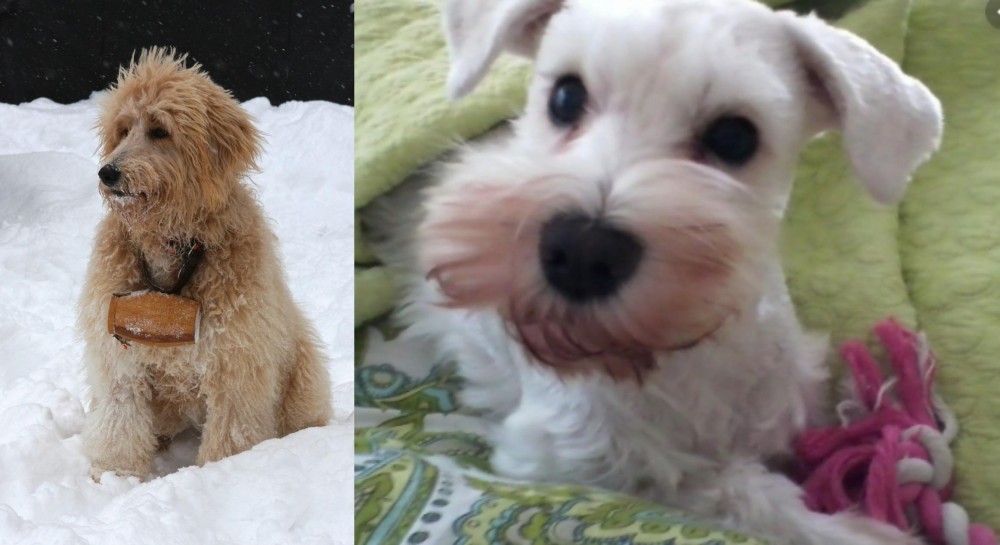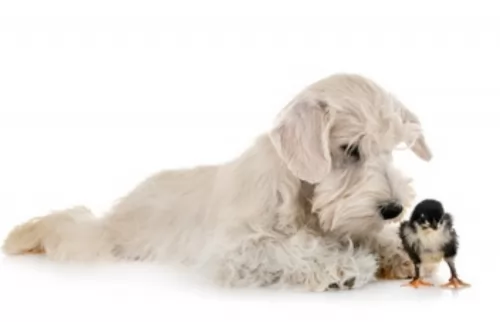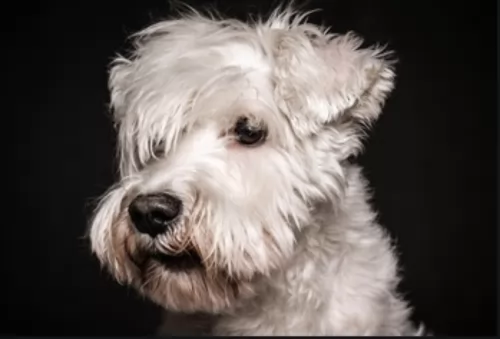 Petzlover
Petzlover Pyredoodle is originated from United States but White Schnauzer is originated from Germany. Pyredoodle may grow 50 cm / 20 inches higher than White Schnauzer. Pyredoodle may weigh 39 kg / 86 pounds more than White Schnauzer. Both Pyredoodle and White Schnauzer has almost same life span. Pyredoodle may have less litter size than White Schnauzer. Both Pyredoodle and White Schnauzer requires Moderate Maintenance.
Pyredoodle is originated from United States but White Schnauzer is originated from Germany. Pyredoodle may grow 50 cm / 20 inches higher than White Schnauzer. Pyredoodle may weigh 39 kg / 86 pounds more than White Schnauzer. Both Pyredoodle and White Schnauzer has almost same life span. Pyredoodle may have less litter size than White Schnauzer. Both Pyredoodle and White Schnauzer requires Moderate Maintenance.
 These dogs only originated in the 1980s, and as a designer dog they are a cross between a Standard Poodle and the Great Pyrenees, both ancient dog breeds.
These dogs only originated in the 1980s, and as a designer dog they are a cross between a Standard Poodle and the Great Pyrenees, both ancient dog breeds.
The breeders were looking for a non-shedding variation of both these popular breeds. This dog isn’t part of the American Kennel Club’s (AKC) list of dogs.
 The White Schnauzer was established in Germany in 2006 for people looking for this particular breed of dog but in white.
The White Schnauzer was established in Germany in 2006 for people looking for this particular breed of dog but in white.
The traditional color is salt and pepper. It seems that breed societies don’t allow the white breed, saying they don’t conform to the ideal breed standard.
The White Schnauzer is officially recognized in Germany, If you have a White Schnauzer you may not be able to show him with some of the major kennel clubs.
White is one of the four color varieties of the Miniature Schnauzer and it is also recognized by the Fédération Cynologique Internationale.
 The Pyredoodle is a large dog standing at between 60 and 86cm in height and weighing about 38 to 46kg.
The Pyredoodle is a large dog standing at between 60 and 86cm in height and weighing about 38 to 46kg.
The coat varies quite a bit, depending on which breed the dog leans towards. Colors can be white, cream, apricot, silver or black. Essentially the coat is a thick double-coat of medium length hair which is fairly straight or wavy.
The dog is a low shedder, thought to have a hypoallergenic coat. Floppy ears mean you will need to check inside the ears for redness and infection brought on by an excess wax build-up, dirt and moisture. If you allow your Pyredoodle to become a parent, the can produce between 2 to 4 puppies.
Coming from dogs with good temperaments, the Pyredoodle comes as being good natured. He plays well with children and gets on well with other animals in the house.
He is protective and takes his role as watchdog seriously. You can be sure he is going to be a loyal family dog. His high intelligence means he can be trained and socialized with ease and then he becomes obedient and well mannered.
He is good with children, and even though he is looked upon as being sweet natured, he still makes a great watchdog and protector of his human family.
 There are a number of different types of White Schnauzer. The white Schnauzer is actually one of 4 color varieties and these dogs are always miniature Schnauzers.
There are a number of different types of White Schnauzer. The white Schnauzer is actually one of 4 color varieties and these dogs are always miniature Schnauzers.
You won’t easily find a Standard- or Giant dog in white. They aren’t albinos, as the skin does have some pigment.
These dogs also have that square-shaped build and they stand between 28 to 36 cm in height and weigh between 4 and 7kg.
The coat is wiry with a soft undercoat. The ears are often cropped to stand erect, but if left they are half-erect, half-floppy and fold forward.
The White Schnauzer is an intelligent dog who will be able to be socialized and trained easily.
He is an energetic little dog and very playful and will get along well with children, loving the games they provide and loving to spend time with all members of his family.
He is loving and affectionate and is willing to share his home and people with other dogs too. He will make you a good watchdog, perhaps encouraged because of his reserve with strangers.
If you provide him with the right amount of mental and physical stimulation, he can become a balanced dog with an amicable personality.
 Attractive to look at, independent in nature, the Pyredoodle also has watchdog characteristics, being a protector of his human family.
Attractive to look at, independent in nature, the Pyredoodle also has watchdog characteristics, being a protector of his human family.
Like any dog, and particularly big dogs, it is important to train the Pyredoodle otherwise he could be too active and unruly when he comes indoors.
The Pyredoodle will absolutely thrive in a loving home where the people enjoy an active lifestyle.
The Pyredoodle comes from too excellent dog breeds. Both breeds make excellent watch dogs, they’re intelligent dogs who can be easily be trained. You can expect your crossbreed dog to be a loving, loyal, devoted pet who will add a wonderful dimension to your household.
 The White Schnauzer is such an adaptable little dog and he will happily adapt to life in the city or in the countryside, just so long as he is close to his human companions and gets sufficient exercise.
The White Schnauzer is such an adaptable little dog and he will happily adapt to life in the city or in the countryside, just so long as he is close to his human companions and gets sufficient exercise.
He is a sociable dog that just loves to be around his human family and won’t like to be separated from them for too long.
He makes a great family dog when you provide him with the right food, a warm dry place to sleep, exercise and lots of love and attention.
 Designer dogs are often bred with the idea to eliminate some of the typical, common health issues that plague most dogs. These are among others, bloat, cancer, hip dysplasia, skin issues, ear infections, obesity, dental disease and others.
Designer dogs are often bred with the idea to eliminate some of the typical, common health issues that plague most dogs. These are among others, bloat, cancer, hip dysplasia, skin issues, ear infections, obesity, dental disease and others.
It is highly unlikely that your lively Pyredoodle will succumb to any of the major dog illnesses, but you need to watch him and get him to the vet when you see him displaying unnatural symptoms.
It is beneficial for your pet's health to have it neutered or spayed if you aren't interested in the dog having puppies.
 While he is a spunky, robust type of dog, there are always going to be some health concerns to look out for.
While he is a spunky, robust type of dog, there are always going to be some health concerns to look out for.
Kidney stones may well not cause your pet the same pain that humans endure, but they are still a cause for concern. A kidney stone that gets too large and lodges in the ureter becomes a ureterolith. This can be very painful, resulting in pain and even vomiting.
The kidney can even swell and become damaged. Your dog could become critically ill, particularly because of the disrupted flow of urine.
Your pet will possibly have blood in the urine, fever, lethargy, poor appetite and weight loss. Veterinary-intervention will be imperative.
 The Pyredoodle is a large dog who will need regular exercise. Apart from walks every day, he’ll need ball- and rope games, throwing the frisbee, hide and seek games as well as games and toys that keep him mentally active as well.
The Pyredoodle is a large dog who will need regular exercise. Apart from walks every day, he’ll need ball- and rope games, throwing the frisbee, hide and seek games as well as games and toys that keep him mentally active as well.
With the Pyredoodle, never try to skimp on his food and buy the cheapest there is. He’ll get sick often because of the unwholesome ingredients such as colorants, preservatives, fillers and very few vitamins and minerals.
If you choose one of the commercially manufactured dog foods, make sure it is the high quality ones. Give him a treat now and again by providing him with tasty home-cooked food. It doesn’t have to be every day, just once or twice a week.
An excellent choice of food is boiled chicken, brown rice or pasta, sweet potatoes, carrots and spinach, all chopped up and added to the dry kibble. When you can, try and include a little bit of raw meat too. Make sure he has constant access to fresh, cool water.
The Pyredoodle can have a coat which can be either short and thick or it can be longer, wavy or quite curly. Grooming will be aimed at removing any loose hairs the dog has by brushing twice a week. The dog is a low shedder.
His floppy ears may mean you needing to check the insides to ensure they are free from infection. Other grooming for this dog includes trimming the nails, checking his eyes and looking inside his mouth for rotting teeth. A bad tooth can be terribly painful for your pet but it can also cause problems with other body parts such as the heart and kidneys.
Get your pet immediately to the vet if you suspect anything that can be detrimental to your dog’s health.
 He is a low shedding breed so he will require a brushing just once a week. These dogs also have a certain professional grooming cut. Some schnauzer dog owners do stripping but this is mostly for show dogs.
He is a low shedding breed so he will require a brushing just once a week. These dogs also have a certain professional grooming cut. Some schnauzer dog owners do stripping but this is mostly for show dogs.
Most people just have them sheared to make it easy to groom them. Whether stripped or clipped, they nearly always have a beard and bushy eyebrows.
Trim your pet's nails and give him a general once-over during the grooming sessions to ensure all is well.
You White Schnauzer relies on you to make wise food choices for him. He will eat most things you offer him. That doesn’t mean you should as you can cause him to have a whole lot of digestive problems.
If you choose to give him commercially manufactured dog food, make sure its a high-quality one – devoid of toxic ingredients such as colorants, fillers and preservatives.
If you don’t know how to choose, your vet can show you the foods they have in stock and which would suit your pet best.
A little bit of home-made food now and then can also be good, but the food needs to be plain and simple to avoid abdominal pain. Boiled chicken brown rice and vegetables chopped up and added to the dry kibble occasionally can be a very good choice.